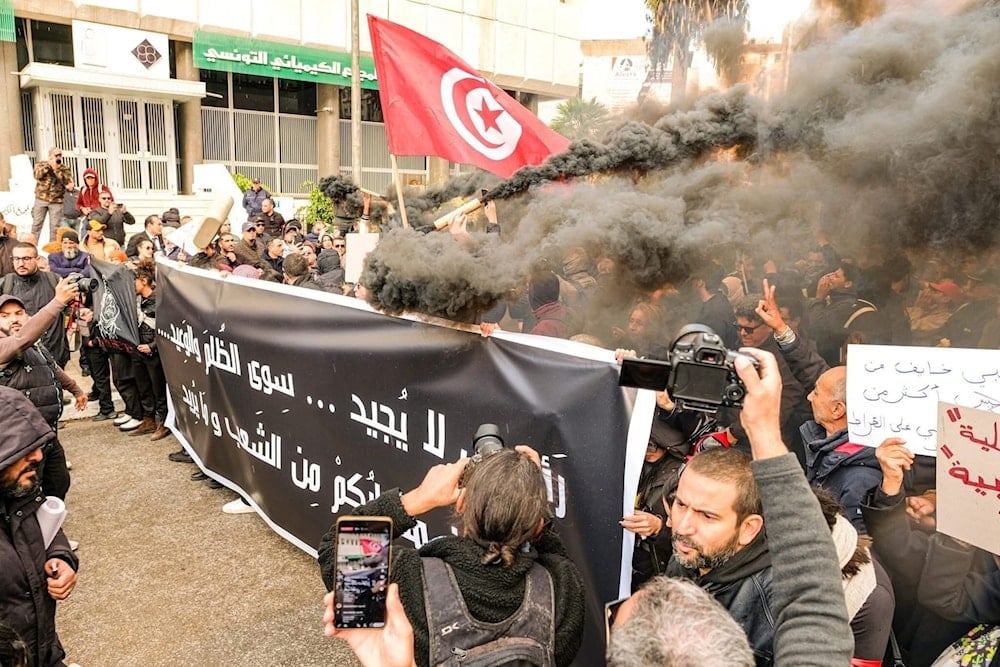Tunis rally condemns Saied’s rule amid human rights concerns
Thousands of Tunisians rally in Tunis denouncing political repression under Kais Saied, amid arrests, judicial crackdowns, and the Gabes environmental crisis.
-

Protesters hold banners against the Tunisian President Kais Saied in Tunis, Tunisia, November 22, 2025 (Social media)
Thousands of Tunisians marched through the capital on Saturday in a massive protest, denouncing what they described as a rise in "injustice and tyranny" and accusing President Kais Saied of entrenching one-man rule by using the judiciary and security forces against his opponents.
The protesters, many dressed in black as a symbolic gesture of what they see as the country "sliding into a vast, open-air prison," gathered in a rare show of unified political opposition to Saied. The demonstration included civil society organizations and political parties from across the spectrum, a notable moment of convergence since Saied began ruling by decree in 2021.
This protest is the latest in a series of popular movements that have rocked Tunisia for weeks, with participation from journalists, young doctors, and transport and banking sector workers, coinciding with a mounting environmental crisis in the southern city of Gabes.
Authorities have turned Tunisia into a prison
Chants of "We are suffocating," "Enough with the dictatorship," and "The people want the fall of the regime" echoed across the crowd before the march headed toward the headquarters of the chemical industrial group in a show of solidarity with Gabes residents. The residents are demanding the dismantling of industrial units they blame for causing severe pollution.
"The authorities have turned Tunisia into a large prison... We are all under provisional release. We will not be silent and we will not hand Tunisia over to him," said Ezzidine Ben Mbarek, the father of detained politician Jawhar Ben Mbarek, in a statement to Reuters.
Opposition parties and civil society groups complain of what they term an "unprecedented crackdown" targeting activists and journalists through arrests, summonses, and asset freezes. Last month, three prominent human rights organizations suspended their operations after being officially ordered to do so, accused of receiving foreign funding.
Crackdown on human rights organizations reached critical levels: Amnesty Intl.
In a recent report, Amnesty International stated that the "escalating crackdown on human rights organizations has reached critical levels," citing arbitrary arrests, banking restrictions, and the suspension of 14 organizations.
Saied's opponents accuse him of undermining judicial independence after he dissolved the Supreme Judicial Council and dismissed dozens of judges in 2022, a move political and human rights forces labeled an "institutional coup". Several party leaders, journalists, and activists are currently imprisoned on charges of "conspiring against state security."
President Saied has denied these accusations, stating that he is working to "purge the country of traitors and the corrupt" and insisting that he does not seek dictatorial rule.
Tunisia's face-off with dictatorship
In the lead‑up to the October 2024 presidential election, the Tunisian authorities undertook a sweeping campaign to neutralize political challengers. More than a hundred members or supporters of the opposition Ennahda party were arrested under counter‑terrorism laws, including approved presidential candidate Ayachi Zammel, who was later sentenced to long prison terms. Judicial and electoral institutions were restructured to put them under executive control; for example, the electoral commission was re‑shaped in 2022 to be more directly linked to the presidency.
Once his 2021 power grab, in which he suspended parliament, assumed decree powers, and dissolved the judiciary‑oversight body, was firmly in place, Saied moved to systematically suppress dissent. In 2022, he dissolved the Supreme Judicial Council and dismissed dozens of judges, raising concerns over judicial independence.
By 2025, mass trials were underway: opposition figures, lawyers, businesspeople, and media professionals were being convicted of “conspiracy against state security” or terrorism‑related charges, with some sentences stretching as high as 66 years. A prominent trial that began in March 2025 targeted 40 individuals, resulting in the conviction of 37 defendants in April, with prison terms ranging from 4 to 74 years.
At the same time, the civil society space in Tunisia was under heavy assault. Authorities froze the assets of non‑governmental organizations, suspended operations of at least 14 such groups in 2025 alone, and used foreign‑funding legislation as a pretext to shut down independent watchdogs. Critics argue that the pressure on civil society aims to eliminate independent oversight and limit international scrutiny.
Saied and his supporters maintain that their campaign is focused on “purging the country of traitors and corruption.” However, human rights organizations, opposition parties, and international observers increasingly view the legal tools and judiciary as being weaponized against dissent, entrenching one-man rule and weakening democratic safeguards.

 4 Min Read
4 Min Read








